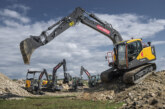Fluid analysis reveals a lot about the health of a machine. Finning UK & Ireland, official distributor for Caterpillar® equipment, runs a purpose built fluid analysis laboratory near Leeds, which is a pioneering centre for analysing equipment lubricants, fuel and filters. Stephen Haughton and his team of technicians & diagnosticians carry out tests on these samples and sediment from filters in order to understand exactly what makes a machine tick, and crucially, what’s required to keep it up and running.
In 1895, Wilhelm Röntgen, a professor of physics at Würzburg University, discovered the X-ray. He named it X because it was an unknown type of radiation. The X-ray gave doctors the ability to see what was happening inside a body, without having to make a single cut. The maintenance of construction machinery is of course very different from practicing medicine, but what they do have in common is that it’s vital to know what is happening on the inside.
Through the fluid analysis laboratory, operators can learn a lot about the health of their equipment, by analyzing the engine oil, fluid from the transmission or the hydraulic system. For instance, oil is tested for metal wear particles and water contamination, which can have detrimental effects on the engine if they go undetected.
If the test results of an engine oil sample show an elevated level of Potassium and Sodium for example, the experts will suggest checking the engine for an internal coolant leak. If this test also indicates an elevated level of lead, then the coolant leak has begun to affect the bearings of the engine. Knowing such indicators of engine health before an imminent engine failure could save operators many thousands of pounds on potentially costly repairs and unscheduled downtime.
Stephen Haughton oversees the operations of the laboratory — testing several hundred thousand samples per year. He enjoys speaking to customers about how his team have interpreted their test results and how they can optimize the maintenance of their machinery. When a more specialized testing request comes in, such as evaluating the particles captured within a filter from a tunnel boring machine, Stephen rolls up his sleeves and does the evaluations himself.
Trend or snapshot?
For the technicians at the fluid analysis lab, the result of a test is just as important as having a record of fluid samples over a longer timeframe. If they receive regular samples, they can interpret trends and analyze abnormalities.
With the help of the Finning fluid analysis lab, maintenance cycles of many systems could be switched to condition-based monitoring, rather than relying on changing fluids after fixed intervals. For instance, a Cat 740 ejector truck can have up to 14 different fluid systems. For anything other than the engine, the fluids can be changed depending on their condition, which results in significant cost & labour savings as well as less waste oil to dispose of.
For Stephen and his team, their work is not finished when they write up an analysis of the test. They teach engineers how the samples should be taken, how to fill out the paperwork and offer advice on the interpretation of the reports. The lab staff also ensures the customers have all the material they need to take the tests, provide access to their online platform and register the samples into the portal.
When the technical staff visit customers, they want to understand the environment in which the equipment operates, which gives them clues about the external impacts on machine health. After all, even regular X-rays do not tell the doctor what kind of lifestyle the patient leads. So, next time you send in a sample to the Finning lab, they know the inside as well as the outside of your machine.









